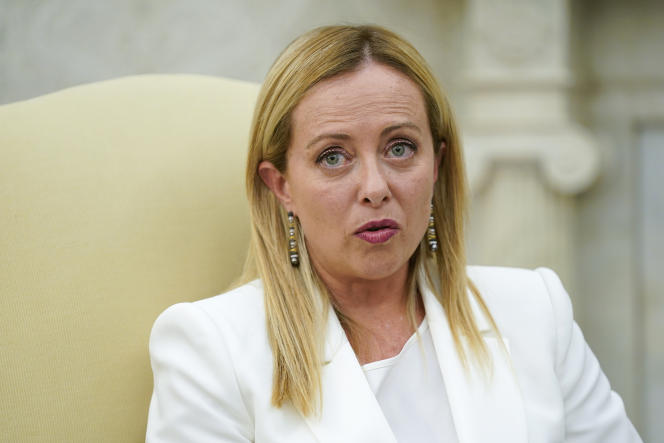The titles of Italian banks, heavily heckled on Tuesday, resumed color, Wednesday August 9, on the Milan Stock Exchange, after the decision of the far-right government of Giorgia Meloni to put a ceiling on the tax on their “surpluses”. “In order to preserve the stability of banking institutions”the decree provides “a ceiling for the contribution, which cannot exceed 0.1% of total assets” of a bank, announced Tuesday evening the ministry for the economy, anxious to calm the stock market storm.
The surprise decision by Mrs Meloni’s government coalition to levy a 40% tax on “surpluses” banks generated by the rise in interest rates caused Tuesday the tumble of securities of the financial sector on the stock market. Italy’s top two banks, Intesa Sanpaolo and Unicredit, lost 8.6% and 5.9% respectively at the close. Monte dei Paschi di Siena fell by 10.8%, BPER Banca by 10.9% and Banco BPM by 9%. Italian banks have thus seen 9.5 billion euros of capitalization go up in smoke in a single session, according to calculations by the financial information agency Radiocor.
On Wednesday, the banking sector experienced a sharp rebound on the Milan Stock Exchange. Intesa Sanpaolo gained 2.3% at the close, its rival UniCredit 4.4% and Banco BPM rose 5.4%.
“Unfair margins”
Revenue from the taxation of “unfair bank margins” will serve to “finance support measures for households and businesses” who cross “a difficult period due to the high cost of money”argued Wednesday Mme Meloni. “We have decided to introduce a 40% tax on the unfair difference in net interest income”namely the difference between what “banks charge you for lending you money and what they concede when you deposit money”said the Prime Minister in a video posted on Facebook. Given the difference between interest rates for loans and current accounts, “We have decided to intervene with the only instrument available to the government, namely taxation”she explained.
“We have been saying for months that the European Central Bank is wrong to raise interest rates”and this tax in “is the inevitable consequence”assured Tuesday the Deputy Prime Minister, Antonio Tajani.
Italian banks have seen their income generated by interest soar in the wake of the rise in interest rates, without increasing the remuneration of their customers’ current accounts in the same proportions.
Limited revenue
The banks that have “already adjusted their rates” by reducing the gap between borrowing rates and interest on current accounts, “will not be significantly affected” by the tax, promised the Ministry of the Economy on Tuesday evening.
According to the employers’ organization Unimpresa, Italian banks remunerate the 669 billion euros of bank deposits at an average of 0.32%, while the rates on 1.312 billion euros of loans to families and businesses reach 4.25 %.
The World App
The Morning of the World
Every morning, find our selection of 20 articles not to be missed
Download the app
After the ministry’s intervention, economists have significantly lowered their estimates of tax revenue. Cap the contribution at 0.1% of assets “significantly reduces the impact of the tax”, Jefferies analysts commented on Wednesday. The latter now estimate the total cost for the banks at 2.5 billion euros against 4.9 billion previously.
The tax on banks’ “excess profits”, which must be settled by June 2024, will concern the accounting years of 2022 or 2023. The 40% levy will be made either on the part of the net interest income of 2022 exceeding d at least 5% the amount for the 2021 financial year, i.e. on the profits of 2023 for which the threshold is set at 10%.
Banca Generali, controlled up to 50.17% by the number one insurance company in Italy, has already released its calculator. CFO Cristiano Borean quantified its impact at “just under 20 million euros” for the bank and “just under 10 million euros” for the Generali group, i.e. a fairly limited amount.
